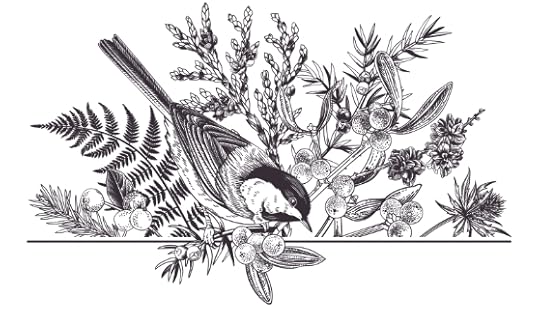Alix James's Blog
October 27, 2025
Want another sneak peek?
 Chapter Two Preview
Chapter Two PreviewDarcy set aside the ledger, the numbers already lost to him, and leaned back in the chair. The silence offered no balm. Once, Georgiana’s music had softened such hours; now the quiet was stark, stripped of any note that might have eased his mind.
He rose and crossed to the escritoire in the far corner. A few letters lay upon it, received and unanswered: Lady Matlock’s looping hand, full of warmth and insistence, urging him to join the family in Town; Georgiana’s smaller, careful script, polite and cool where once it had been eager and unguarded.
He touched the topmost page without opening it. There had been a time when her letters were confiding, filled with her music and her little triumphs. Now each line was cropped short, correct, and held at a distance—as if affection must be counted out like coins before it could be spent. He did not need to see the words again to feel the space they left between them.
With a snap of his wrist, he closed the drawer and pulled open another. A small bundle lay within, tucked inside a worn leather case that might have once held a watch. He drew it out with hesitation that mocked itself—what was the use of such a trifle to a man who prided himself on sense and sobriety? Yet he did not put it back.
A length of green ribbon lay coiled within, faded now at the edges, still soft where it had once tied back dark curls. He remembered it too clearly: the days at Netherfield, when Elizabeth Bennet’s light step and ready hands had brought life to every room she entered. The ribbon had slipped free one evening, as she leaned near the hearth to warm herself after tending her sister. She had searched for it briefly, laughing at her own carelessness, before forgetting it in the press of other concerns. He had come upon it the next morning, fallen against the leg of a chair, and had tucked it into his pocket as though it were a treasure.
He ought to have returned it. Any other man would have left it for the maids. Instead, he had folded it away, telling himself it was nothing. Nothing—and yet it had followed him from Hertfordshire to London, from London to Kent and London again, then back to Derbyshire, until now it lay hidden in his desk like a guilty talisman.
Darcy turned it between his fingers, the silk catching the firelight. Foolish sentiment. A man of honour should not cherish what could never be his. Yet it was the only piece of her that time and distance had not taken.
Her eyes at Hunsford had condemned him; her words had struck with a justice he could not dispute.
And afterward, when Lydia Bennet’s folly had become the talk of every drawing room, when George Wickham had ruined the entire Bennet family and Darcy had heard of it too late to spare anyone the damage, he had understood what it must mean for them all. If there had ever been the faintest hope, it was extinguished then. Elizabeth Bennet was lost to him.
And still, he kept her ribbon.
He pressed it briefly to his palm, then folded it once more and laid it back in the case. When he shut the drawer, it was with the finality of a man determined to forget. But as he returned to the fire and stood with one arm braced against the mantel, the memory lingered. Elizabeth, her head bent over her ailing sister; Elizabeth, walking briskly through Netherfield’s halls, eyes bright with wit and spirit. Elizabeth, who had seen him at his worst, and who, despite all, he could not cease to—
Darcy closed his eyes. Such thoughts were useless. She could never forgive him; and even if she could, her family’s disgrace would forever stand between them. To think of her was to indulge in a fantasy that mocked them both.
The clock on the mantel struck the hour. He stirred the fire once more and told himself he would write to Lady Matlock in the morning, declining her invitation. He would not go to town; he would not go to Kelton; he would not go anywhere that offered company. Let Richard spend Christmas in merry society. For Darcy, solitude was safer.
And yet, as he turned back toward the desk, his eyes fell unbidden to the closed drawer. The ribbon lay hidden there, silent as memory, whispering of what remained.
Morning in Gracechurch Street had its own cheerful order, though the house was quieter than Elizabeth sometimes wished. The maid brought in a tray of warm rolls, the kettle sang on the hob, and the fire kept a modest brightness against December’s chill. Outside, cartwheels splashed on the stones and a hawker’s cry drifted faintly through the fog. Within, the sitting room was tidy, the air touched with the scent of orange peel where Mrs. Gardiner had set a saucer near the grate.
Elizabeth sat by the table, her fingers busy tying sprigs of evergreen into a simple garland. The task was small enough to be called trifling, but it pleased her to give shape to the room with a little winter colour. Across from her, her aunt held a piece of mending in her lap. The needle moved carefully, steadily, but the lines of her face betrayed more effort than the task required.
Elizabeth rose and poured out the tea, and set a cup within reach. “You are determined to be useful,” she said, softening her tone with a smile.
Her aunt returned it faintly. “It is better than brooding. And I have decided—I am determined to go, Lizzy, even if it does me a few cold days on the road. I had my own letter from Louisa this morning, and I cannot disappoint her. If I keep to moderation, the journey may do me no harm.”
Elizabeth set her own cup aside, touched both by relief and concern. “You will not be overtaxed?”
“Not if you contrive to scold me when I attempt too much,” Mrs. Gardiner answered, her needle pausing with the ghost of amusement. “Your uncle really must go on to Northampton, and I would rather go with him most of the way than make him travel alone.”
Mr. Gardiner entered at that moment with a packet of letters in hand, his step brisk despite the damp morning. “The post is obliging,” he declared. “One from Longbourn, another from Northampton. Both clamouring for our attention.”
Elizabeth accepted the familiar hand with a mixed anticipation. Her mother’s letters seldom failed to amuse and weary in equal measure. She broke the seal and read aloud, abbreviating where the exclamation points grew too numerous.
“‘My dear Lizzy—your Aunt Phillips insists it is the talk of the neighbourhood that Netherfield has not been given up at all. Mr. Bingley may return any day. You will not suppose your sister Jane intends to lose her chance, so she must remain with us through the season. No excuse will be accepted.’” Elizabeth lowered the sheet and shook her head. “Poor Jane. She deserves better than to be tethered to a rumour.”
Mrs. Gardiner’s mouth compressed with gentle disapproval. “Your mother means well, but hope should not be built on such foundations.”
Elizabeth smoothed the paper and returned it to the table. “Jane bears it with patience, as she always does. But I cannot like to think of her future balanced upon Mama’s fancies.”
“Then let us be grateful your own is not,” her uncle said, with the cheerful practicality that never failed to steady a room. “We have more immediate matters to arrange. Taylor writes from Northampton: it is quite settled now that I must look in upon them before the year’s end. If we are to go north, my dear, it ought to be soon”
Mrs. Gardiner lifted her gaze. “I should like to see Louisa as soon as may be. If the roads are kind, then perhaps we may depart before the end of the week.”
“Very good,” Mr. Gardiner agreed. “I shall write to say as much. If the frost holds, we will leave for Towcester by Thursday, and from there I will go on to Northampton. You will be better off with Louisa’s hearth than in a draughty counting-house.”
Elizabeth gathered her workbasket, heart tightening in that odd mixture of anticipation and resignation that had become so familiar. There was no question of her returning to Longbourn while her aunt and uncle ventured north. Her aunt’s spirits had been too fragile to consider such a thing.
Besides… there was nothing worth returning to Longbourn for just now.
The journey itself promised variety: the bustle of an inn yard, the simple cheer of her aunt’s old friend, and perhaps the brightness of another household if the roads carried them farther. She did not deceive herself into expecting delight. Her own chances of happiness had been spent too dearly. But she could still be glad for her aunt’s comfort and her uncle’s satisfaction. That was reason enough.
When the letters were answered and the household began its modest preparations, Elizabeth stood at the window. A sleet of fine snow traced the glass, softening the outlines of the street below. The world beyond London seemed suddenly closer, as if the roads themselves were urging them onward. She drew the curtain against the draft and whispered a quiet wish—not for herself, but for those she loved—that the journey north might be gentle, and that Christmastide would bring them some measure of peace.
“You will drive yourself into the floorboards at this rate,” Richard said, striding into the library without ceremony. “Every time I see you, you are in this chair or bent over those ledgers, as if Derbyshire itself would collapse without your hand upon it.”
Darcy’s fingers twitched toward the desk drawer before he caught himself. The brass handle was flush, the lock secure—nothing to betray what lay hidden within. Only then did he look up, schooling his features into calm as Richard planted himself before the fire.
Darcy folded his arms, leaning back. “It is my duty to see Pemberley secure. If others squander their time, I cannot afford to.”
His cousin’s brows rose. “Duty again. You wear the word thin, Darcy.”
“It is what sustains me.”
Richard looked down at him for a long moment. “Sustains? It devours you. I have seen men come off a march half-dead, and they carried more life in them than you do sitting here by your fire.”
Darcy’s gaze tightened on the flames. “You speak of what you cannot understand.”
“I understand more than you credit me. You think yourself alone in loss? I have buried comrades enough to know the look of a man who believes the best part of life is behind him.”
Darcy’s hand curled against the arm of the chair. “What remains to me is enough. Pemberley thrives. My tenants are content. That is sufficient.”
“And Georgiana?”
The name struck like a blow. Darcy looked up sharply, but Richard’s expression did not waver.
“She is well cared for at Matlock House,” Darcy said stiffly.
“She is cared for, yes. But does she confide in you now, as she once did?”
Darcy’s silence was answer enough.
Richard’s voice gentled. “You are losing her, cousin. Not to scandal, nor to Wickham—God be thanked—but to distance. To silence. And you let it happen because you will not face what it costs to reach her.”
Darcy rose abruptly, pacing to the far side of the hearth. “Do you think I do not feel it? I have done all I know, and still—still—” He broke off, pressing his palm against the mantel. The fire hissed as a log collapsed into ash. “I cannot command her heart to trust me. Nor anyone’s.”
Richard watched him steadily. “Then perhaps it is time to stop commanding and start seeking.”
Darcy let out a short, humourless laugh. “Seeking what? More society? More empty hours of card tables and hollow talk? I have no taste for it.”
“You never did. But once, you endured it for those you loved.”
Darcy turned on him, his voice sharper than he intended. “And look what came of it. My efforts brought only contempt. I will not expose myself again.”
Richard’s eyes narrowed, though his tone remained calm. “So that is your verdict? To shut yourself in this house until duty consumes you? To let Georgiana drift where she may, while you bury yourself alive?”
“I am content,” Darcy bit out.
“You are not.”
Darcy turned from the fire. “Enough, Fitzwilliam. You press me as if my absence from one party or another will unmake the world.”
“Not the world. Only you.”
Darcy only snorted.
Richard’s eyes narrowed. “So that is your verdict? To shut yourself up in this mausoleum until the year turns?”
Darcy’s hand tightened on the mantel. “It is my choice.”
Richard let out a breath that might have been a laugh if it were not so sharp. “Then I will make one of my own. I mean to leave for Kelton Manor on Thursday. If you will not come, say so plainly and I shall quit troubling you.” He reached for his gloves, tugging them on with soldierly briskness. “But I warn you, Darcy—if I ride out of here without you, I may not trouble myself to fetch you again.”
Darcy hesitated, pride warring with weariness. The thought of Richard gone, leaving him alone in this echoing house through Christmastide, ached more sharply than he cared to admit. At last, he said curtly, “Thursday, then.”
Richard glanced up, the corners of his mouth easing, though he offered no triumph. “Very good. I shall see to the arrangements.”
The door shut behind him, leaving Darcy once more with the fire’s restless glow. He sank into the chair, his jaw set. So be it. He would go to Kelton Manor, if only to silence his cousin’s importunity. It could offer nothing but discomfort and wasted hours—but at least it would not be this suffocating solitude.
Still, as the fire hissed low, he felt no lighter for the decision.
To Be Continued!

 The Christmas CollectionShop now Products by Category
The Christmas CollectionShop now Products by Category
 How to Get Caught Under the Mistletoe Read Now
How to Get Caught Under the Mistletoe Read Now
 Mistletoe, Magic, and Mr. Darcy Read Now for Free
Mistletoe, Magic, and Mr. Darcy Read Now for Free
 Mr. Darcy’s Christmas Kiss Read Now for Free
Mr. Darcy’s Christmas Kiss Read Now for Free
 Queen of Winter Read Now
Queen of Winter Read Now
 The Scotsman’s Ghost Read Now for Free
The Scotsman’s Ghost Read Now for Free The post Want another sneak peek? appeared first on Alix James.
October 21, 2025
Christmas is coming! Is your Kindle ready?
 Chapter One Preview
Chapter One PreviewThe fire in Pemberley’s library gave little warmth that evening, though the logs hissed and popped with vigor enough. Darcy sat at his desk with the ledgers open before him, pen idle in his hand. The figures blurred into one another—sound, orderly, sufficient. All was as it should be.
He ought to have felt satisfaction at so prosperous a year. Instead, the very fullness of it left him restless, as though plenty had robbed him of purpose.
Bootsteps echoed in the corridor, brisk and unhesitating, before the door swung wide without the courtesy of a knock. Darcy did not lift his head. Only one man in England would enter his library with such a step and such indifference to ceremony.
“Still buried in accounts?” Colonel Fitzwilliam’s tone carried half laughter, half reproach. “If you continue thus, I shall send word back to Father and inform him we have lost you to figures and firelight.”
Darcy closed the folio with deliberate care. “It is my duty to attend to the estate.”
“Your duty! Always your duty. I have been home scarcely a fortnight, and in that time you have contrived to evade every invitation that has crossed your path. Balls, dinners, musicales—you have refused them all. Do you mean to spend Christmastide locked in this room with your steward’s neat columns for company?”
Darcy rose to stir the fire, though the flames leapt readily enough without his interference. “I prefer to make myself useful.”
“Useful.” Fitzwilliam threw himself into the chair opposite with the careless ease of a man accustomed to camp life. “Darcy, if I wished for lectures in economy, I would seek out a clerk. I came for cheer, and you deny me even the semblance of it. You were not always thus.”
Darcy kept his gaze on the flames. “Times change.”
His cousin said nothing for a moment, then, with exaggerated patience, “Very well. If London is too crowded, then what of Bath? The waters are warm, the company lively. A man might forget his gloom in such a place.”
Darcy gave him a look that would have chilled weaker men. “To sit in crowded pump rooms, trading inanities with strangers? I think not.”
“Indeed,” his cousin answered with exaggerated calm. “If Bath offends you, then Brighton perhaps? A sea-breeze, cards, half the fashionable world gathered in merry idleness.”
Darcy set down his pen more firmly than necessary. “The very notion of it is intolerable.”
Fitzwilliam leaned back, untroubled by Darcy’s brusque refusal. “If not London, Bath or Brighton, what of my cousin Saybrooke? He and his lady wife are hosting a revel on Twelfth Night. A masquerade. Music, dancing, a host of diversions.”
Darcy’s lips thinned. “You know I have no taste for masques.”
“I know you have no taste for anything save solitude and account books,” Fitzwilliam retorted. “But perhaps something quieter would tempt you. A hunting party, a few families gathered together for good food and a warm hearth. Mama’s cousin, Sir Edward Montford has invited me to Kelton Manor in Northamptonshire. He writes that he and Lady Montford mean to make a proper season of it. Not too many guests—enough to fill the halls with cheer, but not so many that a man of sober mind might feel lost.”
“Ah, there it is. Your trump—I knew you would confess your real design soon enough.”
“I did not think my tactics were that transparent,” Richard said with a jerk of his jacket front. “But as I can hardly deny it, yes. I mean to go to Kelton, and I mean to drag you with me.”
Kelton,” Darcy repeated without looking at him. “I cannot leave Pemberley. There are matters that require my attention.”
“Your steward can attend them.”
Darcy turned back to his desk, taking up the quill though he had no intention of writing. “You speak as if estate management were a pastime that may be set aside at leisure. I have correspondence to answer. Accounts to reconcile. Winter is a dangerous season to abandon one’s tenants.”
Fitzwilliam snorted. “Your tenants will not rise in revolt if you absent yourself a fortnight. Admit it, Darcy—duty is your shield. You hide behind it to excuse your solitude.”
Darcy’s hand tightened on the quill. He bent to the ledger once more, though he could not see the figures. “You presume much.”
“I presume nothing. I have eyes.”
Darcy made no reply. The fire crackled, hot and unfeeling, and the silence lengthened until Fitzwilliam shifted in his chair.
“It is no rout in London, Darcy. Sir Edward’s estate lies near Stony Stratford—three day’s ride if the roads are clear. A modest enough company, well chosen, with no idle young misses thrown at your head. You would not be paraded or pressed. Only a few days of tolerable society, and I would have the comfort of knowing my cousin is not burying himself alive.”
Darcy kept his gaze on the figures before him, though the lines blurred into meaninglessness. “You overstate my condition.”
“I do not,” Richard said simply. “You are not yourself, and all the world sees it. If you will not come for your own sake, then come for mine. A man grows tired of his own company.”
Darcy inclined his head, though he did not look up. He heard the scrape of the chair and the solid tread of boots moving toward the door.
“Well, I cannot compel you,” Richard said. “But should you find your solitude less companionable than you imagine, Kelton Manor awaits. I have already sent my acceptance.”
The door shut behind him with a finality that rang through the quiet library. Darcy set down the quill at last, his hand resting on the edge of the desk.
Kelton Manor. Darcy repeated the name with deliberate scorn, as though the syllables themselves might lose their hold if he weighed them with contempt. A hunting party. Cards. Laughter echoing through corridors that were not his own. What purpose could such diversions serve, save to remind him of all he had lost?
He turned another page of the ledger, though he could not recall a single figure he had read. The idea was preposterous. He could not absent himself from Pemberley in the dead of winter. The tenants relied upon his constancy; the steward might require his judgment at any hour. It was not possible.
And if it were… Darcy pressed the quill so hard the nib splintered. What then?
To take his place among easy company, when his very name must call forth only contempt in the minds of those who knew him best? No, solitude was the only refuge left to him. The only safe course.
He shut the ledger at last, the columns swimming before his eyes, and leaned back in the chair. If his cousin longed for noise and diversion, let him take it. Darcy had no need of such hollow cheer.
Elizabeth’s needle pricked twice before it caught the narrow hem true. She drew the thread firm and smoothed the muslin over her knee, more for the comfort of the motion than for any great necessity in the work. The sitting room at Gracechurch Street was warm despite December’s mean temper—coal steady in the grate, lamp trimmed, the faint scent of orange peel and clove where her aunt had set a saucer to dry on the hob. Beyond the window, London kept its own winter music: cart wheels on wet cobbles, a hawker calling, the river’s breath somewhere farther off. Indoors, all was gentler. Mrs. Gardiner had taken the corner chair and was pretending to read; her gaze rested more on the fire than on the page.
“You will ruin your eyes, my dear,” Elizabeth said lightly. “That book has already confessed it will not be improved by your looking through it.”
Her aunt’s mouth tipped. “I am not reading so much as keeping company with the print.” The page turned—carefully, as if it might prefer not to be disturbed—and she set the volume aside. “You are very industrious tonight.”
Elizabeth glanced at the neat stack of finished handkerchiefs. “Industrious is a generous word. I am only determined to arrive at the bottom of a basket that appears to fill itself.”
“Like the loaves and fishes,” Mrs. Gardiner murmured, then reached to the saucer and pressed a clove deeper into the pitted orange rind. “One can hardly complain of abundance in winter, even if it is work one finds aplenty.”
There was a delicacy about her movements—no feebleness, only a care that had not always been necessary. Elizabeth felt it without wishing to name it. She set her needle and drew the lamp a little nearer, so the light did the work that her aunt’s strength ought not. “The house smells very like Christmas already,” she said. “You will have all Gracechurch Street envying us.”
“It will be the envy of very modest noses,” said her aunt, but the smile that accompanied it reached farther than her lips this time.
The door opened to admit Mr. Gardiner in a drift of damp air and city night. He shook the wet from his hat on the threshold and rubbed his hands before the fire with an energy that always cheered Elizabeth. “Cold enough to make a man doubt his virtues,” he declared, “until he remembers that virtue sits by the hearth.”
“Then your virtue is safe,” Elizabeth told him, rising to pour tea. “We have had care of it all the evening.”
“Only do not ask it to add figures,” he laughed, accepting the cup. “I have been with them all day, and they have proved stubborn companions. Yet the day was not wasted. I saw Mr. Taylor about the Northampton accounts; he believes the tanners there will settle before the new year.”
“Northampton?” Mrs. Gardiner looked up, interest pricking beneath her careful calm. “You mean to go yourself?”
“In a day or two, if the roads permit.” He sipped, warming. “I thought to take the northern road end of the week. A quick journey, if the turnpikes are not sulking.”
Towcester called a little picture into Elizabeth’s mind: under-inns steaming, post-boys splashed to the waist, a church tower pale against a pewter sky. “You will not go alone,” she said.
“No, my dear. I meant to ask if you would both accompany me as far as the Allenbys. You remember Mrs. Allenby—Louisa Meredith that was? Your aunt’s old school friend. They have taken a small house near Towcester for the winter. She wrote again last week, begging for a visit when the, ah… when the weather allows.” He softened his voice on the last words, and Elizabeth’s heart swelled with gratitude for the tact.
Mrs. Gardiner’s fingers worried at the corner of her handkerchief and then stilled. “Louisa is very kind. I had thought to answer that we would wait for spring.”
“Spring will not object to being cheated of us,” Mr. Gardiner said. “And the Allenbys are quiet souls. If it is too much—why, I can leave you to their good care and go on to Northampton alone. We will consult the weather and your comfort.”
Elizabeth watched her aunt’s face, the way a shadow of reluctance crossed it and then retreated before something steadier. It was not fear; merely a weighing of what would soothe and what would tire. “I should like you to go,” Elizabeth said softly, directed to the whole room and to one woman in particular. “A new fire to sit by may be as good as a new book, and we have already read this one.”
Mr. Gardiner’s eyes warmed. “Then I shall write to the Allenbys by the morning’s post.” He set his tea on the mantelshelf and drew a folded letter from his pocket. “We have a note from Longbourn as well. Your mother sends a great many exclamation points and the news—if news it is—that Netherfield may not be so empty as all that.”
Elizabeth’s needle paused. She kept her tone even. “Empty houses seldom remain so.”
“So I told her,” he returned, cheerful but kind. “But your mother has decided that a gentleman who does not live in a house may still be said to haunt it. I had begged for your sister to come to us, but your mother insists Jane must remain at home, in case a specter is susceptible to hot suppers.”
Elizabeth could not help laughing, and her aunt’s answering smile came quicker for it. “Poor Jane,” she said, easing the thread through. “When she marries, it shall not be to a ghost.”
“No,” Mrs. Gardiner agreed, gently resolute. “Jane will not live on a perhaps. She is too sensible for that.”
The name and all that hung about it passed through the air like the faintest draught and was gone. The stitch Elizabeth had made was true; the next went in more easily. She was pleased with the steadiness of her hand. Steadiness was a virtue of its own.
“Will the roads bear us, do you think?” she asked, to turn the talk forward. “You know them best.”
“If the frost is hard, they may help us along,” Mr. Gardiner said. “If it is thaw and ruts, we must say our prayers. But Towcester is a town built for travelers; it does not like to be defeated. And from there to the Allenbys is short enough even for a sulky road.”
Elizabeth tied off her thread and bit it clean. “And you would go on to Northampton,” she repeated, tasting the syllables. “A good deal farther on bad roads, is it not?”
“Not so far as to be unreasonable,” he said. His look flickered between them. “I have not promised anything. I only mention it because the invitation reached me to-day, and it would be discourteous to ignore it entirely.”
Mrs. Gardiner smoothed her skirt. “Neighbors are not strangers,” she said, after a moment. “And I should like to see Louisa first.”
Elizabeth’s thoughts ran ahead in a quiet line: the bustle of an inn yard, a smaller hearth with old friends, the safe industry of a kitchen where one may be useful without being noticed. She did not hunger after gaiety; she had no appetite for it. But to sit where her aunt might be cheered and her uncle amused—yes. She could like that very well.
She folded the finished handkerchief and placed it with its fellows. “We shall be governed by the weather,” she decided aloud, and felt the room agree. “And by the Allenbys.”
Mr. Gardiner came to stand behind his wife’s chair, his hand resting for a moment on the worn wood. “Very good. Then to-morrow I will send a note to the Allenbys and another to Northampton, with my compliments and a polite uncertainty.”
“An uncertainty dressed as civility,” Mrs. Gardiner said, the corner of her mouth lifting.
“It is the only coat uncertainty wears in December,” he answered.
When the little bustle of letters and lists subsided, the room took up its earlier peace. Elizabeth threaded a fresh needle, pleased with the quiet weight of purpose that came simply from being useful in the right place. She did not look outward for happiness; she did not expect it to seek her out. But she felt, not for the first time, that there were kinds of contentment which did not require a future to be bright in order to be good to-day.
Her aunt’s book had wandered back to her lap. “Why, Lizzy, I declare you have been practicing. You mend very neatly,” Mrs. Gardiner observed. “I shall have nothing left to do.”
“Then I will begin on Mr. Gardiner’s shirts,” Elizabeth said. “He is forever injuring a cuff out of pure industry.”
“Industry is my only vice,” her uncle protested. “I wear it threadbare.”
“You are safe with us,” Elizabeth returned. “We have a whole basket of virtue to keep you decent.”
After a time the lamplight grew softer, and the sounds beyond the windows dimmed to a hush that was not quite silence. Elizabeth rose to draw the curtain fully and caught a glimpse of the street: wet stones, a trace of white on the step where a late flurry had found a corner to linger. She rested her fingertips against the glass. The cold made a small ring about them and then faded.
“Snow?” Mrs. Gardiner asked.
“A little,” Elizabeth said. “Only enough to make the lamps look friendly.”
She let the curtain fall and returned to her chair. The orange on the hob had warmed; the cloves had given up their sweetness to the air. If the roads held, they would go north—first to a modest hearth, and perhaps beyond. If they did not, she would remain where she was needed, which was no poor fate. She threaded the needle once more and bent to her work with the sort of hope that belongs to hands—quiet, steady, and very nearly content.
To Be Continued!
 More Christmas Reads!
More Christmas Reads!
 How to Get Caught Under the Mistletoe $3.99 Read Now
How to Get Caught Under the Mistletoe $3.99 Read Now
 Mr. Darcy’s Christmas Kiss Read Now for Free
Mr. Darcy’s Christmas Kiss Read Now for Free
 The Scotsman’s Ghost $4.99 Read Now for Free
The Scotsman’s Ghost $4.99 Read Now for Free
 Queen of Winter $2.99 Read Now
Queen of Winter $2.99 Read Now
 How to Get Caught Under the Mistletoe Bonus Epilogue $0.00 Read Now
How to Get Caught Under the Mistletoe Bonus Epilogue $0.00 Read Now The post Christmas is coming! Is your Kindle ready? appeared first on Alix James.
September 4, 2025
Preview The Lady of the Thorn
The morning held a rare stillness. The sort that hovered only in the last days of summer, when the air was heavy with ripened green and the shadows, though short, had begun to lean eastward with a kind of anticipatory gravity.
Darcy rode alone, as he preferred, save for Brutus who trailed a pace behind him with ears alert and tongue lolling in pleasure. The path he took, curving southward through the lower wood, was not the most direct, nor even the most scenic, but it was the one he had followed since boyhood. It pleased him to take it in the same direction, at the same pace, marking the same hedgerows and glens and half-fallen stone wall near the streambed as one might reread a volume long-memorised. The satisfaction lay not in discovery, but in reaffirmation.
Bellerophon moved beneath him with the same comfortable swagger he always had, tossing his dark head whenever the bridle felt too much like instruction. The horse was older now, and moody, but retained that proud edge which Darcy could not entirely dislike. There was an understanding between them: neither suffered fools, and neither pretended patience to be a virtue when it was not sincerely felt.
The sunlight filtered warm through the canopy, dappling Darcy’s coat and hands, and catching at Brutus’s brindled back whenever he darted ahead to nose a scent or leap a stone. The hound was a brute in name only—he had a soldier’s caution and a scholar’s solemnity, and his loyalty, once earned, was irrevocable. At present, he chased shadows and rabbit smells, his tail a metronome of quiet joy.
Darcy’s own mind was pleasantly empty. There had been no troublesome correspondence at breakfast, no new accounts to concern him, and Georgiana had smiled, not nervously, but simply—with that fleeting expression he remembered from their childhood summers, before their father’s illness had pressed gravity upon her shoulders. It had struck him, that smile. Not for its rarity, but for its ease.
Everything was in its place.
The land was in good order—the tenant farms reported a strong yield, the river was low but clean, the beekeepers had brought a second round of honey that was rich and dark with linden. The new hedgerows were taking root near the eastern edge, and even the kitchen garden, prone to temperamental patches, had at last begun to yield its late crop of beans without protest.
Darcy let the rhythm of the ride lull him. Bellerophon’s gait was smooth, and the sound of hoofbeats mingled with the burr of insects and the distant, overlapping calls of wood pigeons.
There was, he thought, a certain moral clarity to land. It was not a sentiment he shared aloud—too sentimental by half—but he felt it all the same. One need only look well, tend what required it, and keep faith with the natural rhythms. The land would tell a man what it needed. And when it thrived, so did he.
He took the lower fork in the path without thinking. It led toward the elder grove—dense and slightly marshy, but not impassable—and if the light held, he might make a wide circuit and return behind the stables.
Brutus darted ahead, tail high, nose to the wind. Darcy let him go, content to follow at a stroll.
He did not notice the silence at first.
The birdsong faded gradually, the way candlelight dims with dusk. The wind quieted. Even Bellerophon’s hooves began to sound strangely muted against the earth.
Darcy frowned—not at any conscious alarm, but at the sensation that something had fallen out of joint. He tightened the reins slightly. The horse did not respond. His ears had gone back, and his breath came faster, more shallow.
Brutus stopped.
The dog stood still at the edge of the copse, one paw lifted, head lowered. He made no sound.
Darcy eased Bellerophon to a halt. “What is it, then?” he murmured, though he did not expect an answer.
The light had changed.
It was not cloud—there were no clouds. The sun still shone somewhere above, but it did not reach the forest floor. The shadows had thickened, and the air smelled strange. Not foul—just foreign. A sweet, overripe tang, like cut flowers left too long in their vase.
He dismounted, more to settle the horse than from any wish to investigate. Bellerophon shifted under him, reluctant, and Brutus gave a low, uncertain huff but did not move.
The trees here were older, twisted. That was not new. The grove had always been a place of denser growth, thornier hedges, roots that curled up from the ground as though trying to speak.
But now—there was something else.
Darcy stepped forward.
The earth beneath his boots was dry—not cracked, but not moist as it should have been in this low place. A few leaves scattered, and he noted their colour—not golden with the season, but dulled and spotted. Sick.
Ten paces more, and he saw it.
A tree—hawthorn, ancient—stood at the center of a shallow rise. Its bark was blackened. Not entirely, but in long, creeping streaks, as if fire had licked along its branches and changed its mind. The leaves, what remained, hung limp, curled inward, brown at the veins.
At its base, a ring of earth had turned to dust. Not churned soil, not erosion—simply… dust. Grey and fine. A breath might scatter it.
Darcy did not speak.
He did not move closer, though his boots were halfway there. His eyes narrowed, not from disbelief, but calculation.
There had been no lightning. No blight in the orchards. No sign of illness among the hedges or trees further down the slope. And yet here stood this—the ruin of a single tree in the middle of his woods, untouched by weather, marked by… what?
Brutus whined.
Darcy turned his head slightly. The dog had crept forward, just enough to press his flank to Darcy’s boot. Not cowardice—he knew the difference—but unease. Waiting for instruction. Waiting for sense.
There was none.
Darcy’s gaze fell again to the ring at the tree’s base. In its center—almost buried, but not quite—was something pale.
He crouched.
A shard of wood? No. Carved.
He brushed away the dust with two fingers. The shape revealed itself slowly. Circular. A groove running its edge. A design, just visible: thorns, looping in a tight braid. No lettering.
The piece was smooth. Old.
He did not recognise it.
Darcy rose slowly, brushing his hand on his coat without realising it. The air felt heavier. The silence pressed.
He looked around—not quickly, not in panic, but with a careful sweep of the trees. Nothing moved.
“Come,” he said to Brutus, more command than comfort.
The dog obeyed, but kept close.
Bellerophon snorted as he approached. His nostrils flared, and his ears remained pinned.
Darcy mounted and turned the horse toward the open path. He did not look back.
By the time he reached the ridge, the sun had returned. The wind lifted. Brutus shook himself and barked once, as if to clear the moment from his memory.
Darcy did not speak the rest of the way home.
***
Elizabeth Bennet did not take the path home directly.
It was not out of defiance—though her mother might claim as much when she arrived late to breakfast. It was simply that the hedgerow along the eastern rise had begun to bloom a second time, and Elizabeth could not resist it. The air was warm but not close, the sun shifting through early cloud in hazy gold bands, and the faintest breeze pressed the leaves into a kind of trembling applause.
She paused by a patch of dogrose, pale and insistent against the bramble. It was odd, their timing. The petals should have been gone by now, but here they were again—fragile and new.
She reached out and touched one with the back of her knuckle.
It shivered under her touch.
A bird trilled nearby, louder than it ought to have been. She turned, half expecting to see it perched within reach, but nothing stirred in the branches. Just a flutter of feathers, retreating through green.
Elizabeth smiled faintly to herself and continued on.
The house came into view just as the bell rang—late enough to rouse Mrs. Bennet’s nerves but not her tears. Elizabeth dusted her boots at the threshold and stepped inside to the familiar sound of chattering voices, clinking porcelain, and Lydia arguing over jam.
“I told you I meant the raspberry,” Lydia groaned. “Why must Jane always take what I was thinking of?”
“You were thinking of sleeping through breakfast,” Jane replied with unbothered grace. “Which is why I poured yours before you came down.”
“I would rather choose my own.” Lydia slumped into her chair. “Besides, it is dreadfully warm. I think raspberry spoils faster.”
Elizabeth kissed Jane’s cheek in passing, exchanged a raised brow with Mary, and accepted her tea from Hill without comment. No one noticed she had not said a word yet.
Mrs. Bennet, however, noticed her hat. “Good heavens, Lizzy, not again! If you come back with burrs in your hair, I shall scream.”
Elizabeth removed the hat calmly and placed it on the peg. “Only petals this time, I believe.”
“That is worse,” her mother snapped. “Petals stain. You will have that ridiculous brown dress looking like a rag by Michaelmas.”
Elizabeth sat. “Perhaps I will embroider it to disguise the evidence.”
“You are too clever by half, Lizzy. No man likes a woman always turning words on end.”
“I shall keep that in mind.”
Jane’s smile tilted just slightly at the edge. “You might as well ask her not to breathe, Mama.”
Mrs. Bennet sniffed. “Well, when she breathes like that, it is no wonder she has not yet had a serious offer. Always off wandering. Always reading books about people who never existed. Why not take a turn about Meryton for once and speak to someone with proper prospects?”
Elizabeth lifted her cup and met Jane’s eyes over it. “Because the people in books, at least, do not snore when they speak.”
Jane pressed her lips together to suppress a laugh. Lydia giggled openly.
Only Mary looked up with something like agreement.
The conversation turned, and Elizabeth let herself drift quiet again. The tea was strong, if slightly over-steeped, and the breeze had begun to rise. Through the open window, the curtains lifted just so, and a flicker of motion caught her eye—a leaf spinning in the air, circling once before vanishing.
The odd thing was: she had not seen it fall.
She blinked, sipped, and turned back to the table.
Outside, the breeze died.
Inside, no one noticed.
***
The library was unusually cold.
It was not a matter of the fire—it burned low but steady on the hearth, and the coals had been properly turned. Nor was it the windows; the draughts had long since been sealed, and Darcy himself had seen to the replacement of the mullioned panes the previous winter. And yet, when he passed beneath the central arch toward the west wall, the air shifted. Just slightly. A draft where there should be none.
Darcy paused, brow furrowed, but said nothing.
Georgiana looked up from the pianoforte. “Is it too loud?”
He shook his head. “No. Only… the tuning is odd.”
She touched a key again, testing. “I had it looked at not a fortnight past.”
Darcy moved toward the instrument, then hesitated. The note had sounded fine just now. But when she had been playing earlier—he could not explain it. The resonance had seemed… wrong. Too thin. Or too full. The sort of imbalance that pricked at the edges of one’s hearing but vanished upon inspection.
He gave a short shrug. “Never mind. Likely I imagined it.”
Georgiana smiled faintly and returned to the final passage of her étude, her fingers moving with cautious elegance. The notes cascaded, even and pure.
Still, Darcy found himself stepping back from the hearth. That part of the room—the left corner, nearest the French window—remained strangely chilled.
He crossed to the desk instead, flipping through a parcel of correspondence. A note from Bingley, predictably cheerful. A circular from Matlock, detailing the latest estate commission. Nothing of concern.
One envelope, however, bore an unfamiliar wax seal.
Darcy slid it open with the edge of his letter knife. It began in an antiquated hand:
Mr. Darcy, I write with reference to a volume in your family’s possession. A transcription of the Harrowe Ballads, which your grandfather once lent to my predecessor for translation. It has come to my attention that the original folio contained a fragment not included in later editions…He read no further.
The Harrowe Ballads.
It was a name he had not thought of in years. The sort of childish lore one was forced to endure from overly romantic tutors. His grandfather had encouraged it—“a sense of duty to our mythic bloodline,” or some such rot. But Darcy had never taken to fables. He had learned the lesson of disappointment early: no vow, sacred or secular, could bring back what was already lost.
He placed the letter in a drawer and closed it.
Behind him, the final note of Georgiana’s piece hung longer than it ought to have. Only a fraction too long—but just enough that both of them looked toward the sound.
She blinked, shook her head slightly, and reached to close the lid over the keys.
“Strange,” she murmured.
Darcy said nothing. The chill had disappeared. The light now pooled evenly across the carpet.
He returned to his correspondence.
***
Coming February 28, 2026 Preorder The Lady of the Thorn now!
Preorder The Lady of the Thorn now!The post Preview The Lady of the Thorn appeared first on Alix James.
March 13, 2025
Audiobook Giveaway!
Rumours & Recklessness: A Pride and Prejudice VariationRumores e imprudencias: Una variación de Orgullo y prejuicio
The Rogue's Widow: A Pride and Prejudice Variation
The Courtship of Edward Gardiner: A Pride and Prejudice Prequel
April 29, 2024
Interview with Pride and Prejudice Book Club
The post Interview with Pride and Prejudice Book Club appeared first on Alix James.
Interview with Melanie Rachel
The post Interview with Melanie Rachel appeared first on Alix James.
April 16, 2024
Communication Skills Class
Consectetur adipiscing eelit, seesd desdo eiusmod tempor incididunt usadeet labore et dolore magna aliqua.
The post Communication Skills Class appeared first on Alix James.
Communication Skills Class
Consectetur adipiscing eelit, seesd desdo eiusmod tempor incididunt usadeet labore et dolore magna aliqua.
The post Communication Skills Class appeared first on Alix James.
Communication Skills Class
Consectetur adipiscing eelit, seesd desdo eiusmod tempor incididunt usadeet labore et dolore magna aliqua.
The post Communication Skills Class appeared first on Alix James.
Communication Skills Class
Consectetur adipiscing eelit, seesd desdo eiusmod tempor incididunt usadeet labore et dolore magna aliqua.
The post Communication Skills Class appeared first on Alix James.



